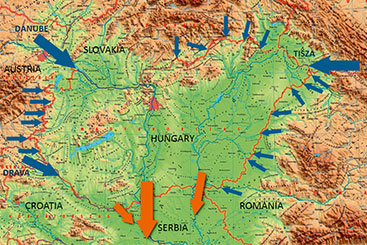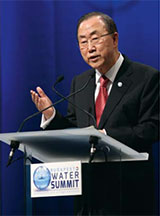A sustainable world is a water-secure world: the Budapest Water Summit


A sustainable world is a water-secure world:
the Budapest Water Summit
While the current Millennium Development Goals address certain aspects of water – namely access to drinking water and basic sanitation – the acceleration of the global water crisis has called for a much broader approach and higher political profile.

Hungary’s complex international water connections make water-related issues all the more important.
© Somlyódi, 2002
In 2010 when the United Nations General Assembly declared 2013 to be the International Year of Water Cooperation it was hardly foreseeable how much importance water issues would gain within three short years.
However the UN system and Member States heeded the call to action in the field of water policy and through a series of international events from The Hague to Dushanbe, scientists, water professionals, policy-makers and businesses gathered to address the role of water in the development vision for the future. The Budapest Water Summit – held between 8 and 11 October 2013 – crowned this International Year of Water Cooperation and served a vital role in stocktaking, synthesis and further guidance.
Setting the stage for water cooperation. Hungary’s special interest in international water policy is clear. Some 96% of the country’s surface waters originate abroad, but water leaves only through three major rivers: the Danube River and two of its tributaries, the Tisza and Dráva Rivers. As a result, one quarter of the country, 700 settlements, 2.5 million people, 40% of the country’s agricultural land and 2000 industrial plants are potentially affected by floods originating beyond the country’s borders. Also, around of half of the country’s groundwater bodies are shared by its neighbours. Thus, for a downstream country in a geographically complex international river basin, international cooperation is a crucial imperative for nature conservation, the economy and national security.

UN Secretary General Ban Ki-moon opens the Budapest Water Summit. © Nagy
In recent decades Hungary has been an active promoter of such cooperation at the European as well as the international level. It spearheaded two protocols of the 1992 UNECE Transboundary Water Convention; it also selected water as its priority topic during its presidency of the EU in 2011. At the United Nations Conference on Sustainable Development in Rio de Janeiro in 2012 Hungary chose water as its flagship issue. The Government organised a series of events in New York in the framework of the Friends of Water Group (where it acts as a steering group member) tacking the most important water-related challenges.
The Budapest Water Summit developed from the need to overcome the structural difficulties that characterise the formal UN decision-making process. János Áder, President of the Republic of Hungary, offered Hungary’s services exactly for that reason in Rio last year: to further the process of defining a stand-alone Sustainable Development Goal on water. Hence the Budapest Water Summit 2013.
A statement on water goals. The Budapest Water Summit welcomed over 1,400 participants from 104 countries, including the UN Secretary General Ban Kimoon; Irina Bokova, Director General of UNESCO; Lamberto Zannier, Secretary General of the OSCE; José Graziano da Silva, Director General of the FAO; Margaret Chan, Director General of WHO; and Michel Jarraud, Chair of UN-Water and Secretary General of WMO. The Summit was designed to bring a fresh multi-stakeholder input into the post-2015 global development discourse.
Transboundary cooperation. In his opening address UN Secretary General Ban Ki-moon stressed that by 2030 nearly half of the global population could be facing water scarcity and demand could outstrip supply by 40%, mainly in shared water basins. He thus called on every nation to ratify the UNECE Transboundary Water Convention, citing the Convention as the best available legal instrument to foster joint, peaceful management of shared water resources.
This is an issue that the Budapest Statement addresses extensively. Among its major political recommendations, it calls for integrated management of transboundary rivers and aquifers at the basin level. It concludes that strong, long-term transboundary cooperation can only be ensured by joint governing institutions, work programmes, shared monitoring and broad international stakeholder participation based on sound legal and institutional principles.
As the international community faces the new threat of water security, Europe and the Danube Basin have an historic role to play. If the example of the Danube countries and the ICPDR leads other regions to reap the unquestionable benefits of water cooperation, this would render the International Year an unmatched success in the history of international water policy.
THE BUDAPEST STATEMENT
A The Budapest Water Summit discussions were summarised in the Budapest Statement under the title “A Sustainable World is a Water-Secure World”. This statement offered a view of the main water-related issues as seen by the international community:
- water must feature as a priority in the new global development agenda through a dedicated Sustainable Development Goal;
- a dedicated Sustainable Development Goal should encompass all major water-related issues, ranging from access to drinking water, through wastewater treatment all the way to disaster management and international cooperation;
- a robust intergovernmental process to regularly monitor, review and assess progress of the implementation of a future water goal should be set up.





